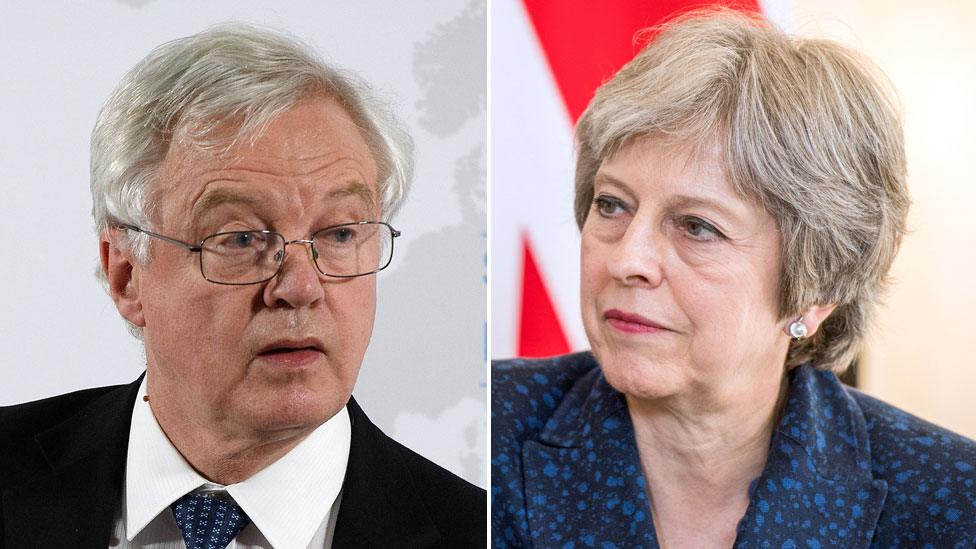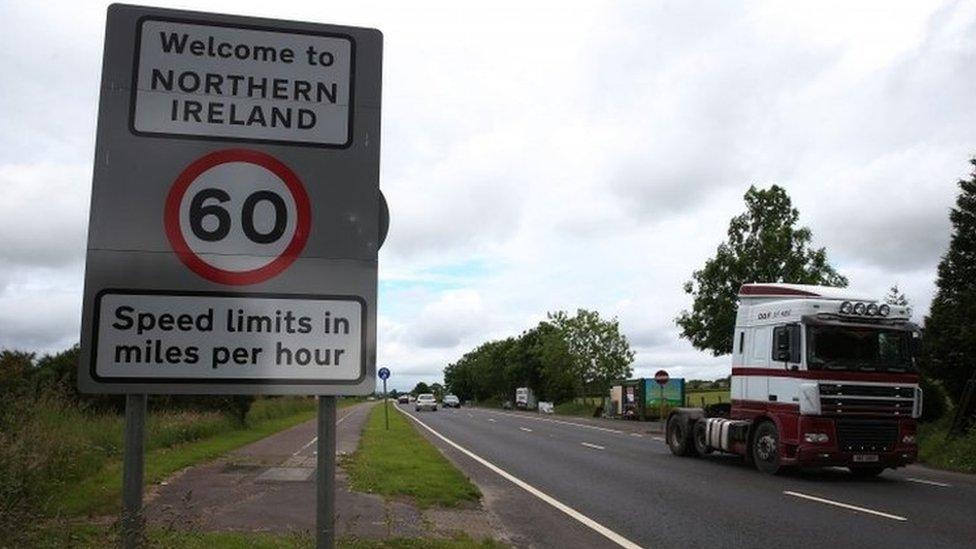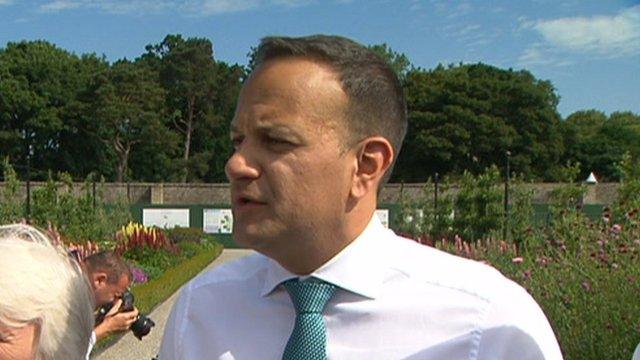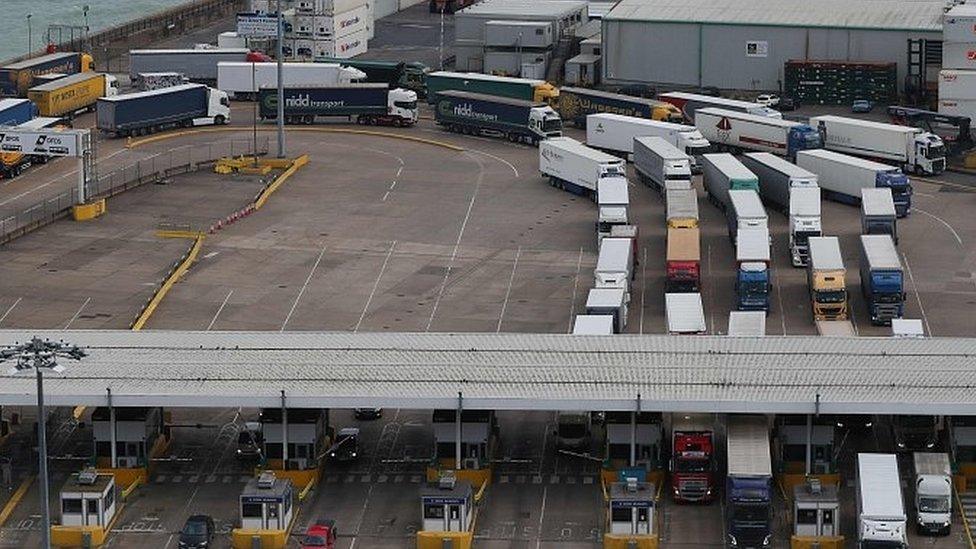Brexit: May and Davis 'agree customs backstop wording'
- Published
- comments

The UK's proposed "backstop" plan for trade with the EU after Brexit has been published after an "expected" end date - of 2021 - was included in it.
It followed crunch meetings between Prime Minister Theresa May and Brexit Secretary David Davis, who insisted a cut-off date be included.
The proposal would see the UK match EU trade tariffs temporarily in order to avoid a hard Irish border post-Brexit.
Brexiteers want to ensure the backstop could not continue indefinitely.
Responding on Twitter, EU chief negotiator Michel Barnier set out the criteria on which he would judge the UK's proposal, including the need for a "workable solution" to avoid a hard border in Northern Ireland.
The European Parliament's Brexit co-ordinator Guy Verhofstadt went further, saying it was "difficult to see" how this could be achieved.
"A backstop that is temporary is not a backstop, unless the definitive arrangement is the same as the backstop," he added.
The UK is due to leave the EU in March 2019, and the government is trying to make progress before a crucial meeting of EU leaders later this month.
Liam Fox is asked: Who governs UK tonight?
BBC political editor Laura Kuenssberg said Mr Davis had "pushed back very hard" against the proposals on Wednesday and had two meetings with the prime minister on Thursday before a deal was agreed.
After the publication, Mr Davis's chief of staff said there had been a "helpful dialogue" and that the document had now been "clarified and amended".
According to the document, external - which has yet to be agreed with the EU - the "temporary customs arrangement", if it is needed, would be "time-limited".
A long-term "future customs arrangement" will be in place "by the end of December 2021 at the latest", it says.
Another cabinet Brexiteer Liam Fox, who also met the prime minister on Thursday, told the BBC: "As everybody knows from the referendum, opinions and feelings run high on this issue but we've shown we can reach an agreement civilly and collectively."
Who's the real winner?
The Brexit secretary claimed a victory, but in Westminster what starts out as a "win" can, by morning, seem like a hollow victory, writes BBC political editor Laura Kuenssberg.
Senior figures in government are questioning whether David Davis really achieved very much.
He may have saved face after making a huge fuss but look carefully at the concession he won, they say, and it doesn't really mean very much.
A few words here, a loosening up of the planned language there, perhaps the victory really was Theresa May's?
What is the customs 'backstop' issue?
The UK has said it will leave the EU's customs union, which allows trade within the EU without any tariffs or many border checks.
The UK and the EU are yet to agree how trade in goods will operate after Brexit - but they have said that a "backstop" option is needed in case no deal is done, or the technology is not ready in time, to avoid the return of a hard border between Northern Ireland and the Republic of Ireland.
The UK has said that the EU's initial "backstop" proposal - effectively keeping Northern Ireland in the customs union - would create what amounted to a border between Northern Ireland and the rest of the UK and was not acceptable.
Instead, the UK is proposing a backup plan which would see the whole of the UK temporarily aligned with the EU's customs union after December 2020 - when the 21-month post-Brexit transition period ends.
The plan, which Theresa May has said would only apply in a "limited set of circumstances", would see the UK match EU tariffs in order to avoid border checks.
What are Brexiteers worried about?
With the EU sceptical about the two options the UK has suggested to replace its membership of the customs union - and government ministers yet to agree which one to pursue - the backstop is "rapidly becoming the only option on the table", former Brexit minister David Jones told the BBC, "so it must be got right".
He said not having a firm time limit would be "damaging to the country": "It would tie us effectively into the the EU's customs arrangement for an indefinite period".
It would prevent the UK from having its own independent trade policy, he said - customs union members are not allowed to strike their own international trade deals.
It would also mean the UK was still under the jurisdiction of the European Court of Justice, which would be unacceptable to most Conservative MPs, he added.
Brexiteer Iain Duncan Smith on David Davis's position
Allow X content?
This article contains content provided by X. We ask for your permission before anything is loaded, as they may be using cookies and other technologies. You may want to read X’s cookie policy, external and privacy policy, external before accepting. To view this content choose ‘accept and continue’.

The view from the EU
BBC Europe editor Katya Adler
"Wow," gushed a European journalist to me the other day, "normally we look to Italy for political drama and uncertainty but the UK is making a pretty good show of it."
So dizzying and confused is the news coming out of the UK about how the EU-UK relationship could and should work after Brexit, that EU negotiators say they are forced to stand on the sidelines while the British government talks and argues with itself.
"It just can't work," an EU diplomat told me in exasperation this week. "Theresa May has so many nooses dangling around her neck that one of those nooses is sure to hang her."
Allow X content?
This article contains content provided by X. We ask for your permission before anything is loaded, as they may be using cookies and other technologies. You may want to read X’s cookie policy, external and privacy policy, external before accepting. To view this content choose ‘accept and continue’.

BBC Brussels reporter Adam Fleming says the EU will apply a series of tests to any proposal about customs from the UK, including how it would interact with the EU's own customs policy, whether it would require the EU to change its rules, and what would happen when new ones were introduced?
What it means for the Irish border

The UK government said its latest proposals would deliver on a commitment, made in December, to avoid creating a hard border between Northern Ireland and the Republic of Ireland, which is an EU member.
In response, Irish Foreign Minister Simon Coveney said it was "vital" that a legally-binding backstop was found to prevent a hard border.
"Clearly, a great deal of work remains to be done and this needs to be the highest priority for all sides in the weeks ahead."
Northern Ireland's Democratic Unionist Party, whose support Theresa May relies on for a Commons majority, welcomed the proposal, saying the EU's version of a backstop had been "totally unacceptable".
"We must also remember that the backstop will only be used as a last resort," said the DUP's Nigel Dodds.
"The focus must now be on getting a new trade deal."
Labour MP Hilary Benn, who chairs the Commons Brexit committee, said the government's plans would effectively keep the UK in a customs union with the EU beyond the end of 2020.
- Published7 June 2018

- Published6 June 2018

